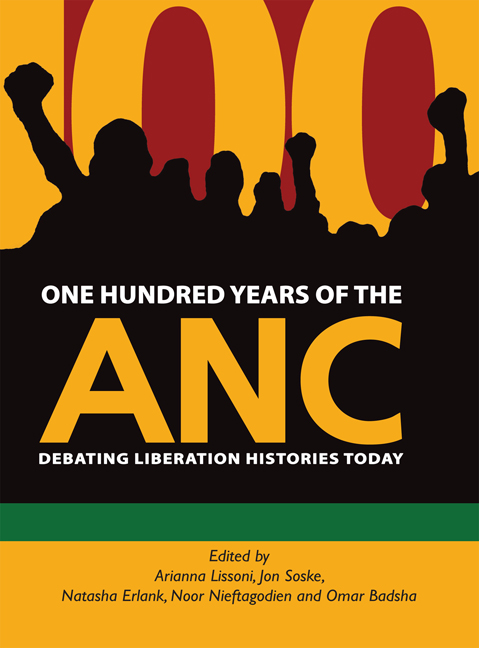Book contents
- Frontmatter
- Contents
- Acknowledgements
- Editorial Note
- FIRST KEYNOTE ADDRESS: Fragmentation and Cohesion in the ANC: The First 70 Years
- SECOND KEYNOTE ADDRESS: A Continuing Search for Identity: Carrying the Burden of History
- Chapter One One Hundred Years of the ANC: Debating Struggle History After Apartheid
- Chapter Two Religion And Resistance In Natal, 1900–1910
- Chapter Three Christianity and African Nationalism in South Africa in the First Half of the Twentieth Century
- Chapter Four Charlotte Maxeke: A Celebrated and Neglected Figure in History
- Chapter Five Imagining the Patriotic Worker: The Idea of ‘Decent Work’ in the ANC's Political Discourse
- Chapter Six Popular Movements, Contentious Spaces and the ANC, 1943–1956
- Chapter Seven Unravelling the 1947 ‘Doctors’ Pact’: Race, Metonymy and the Evasions of Nationalist History
- Chapter Eight The Politics of Language and Chief Albert Luthuli's funeral, 30 July 1967
- Chapter Nine Robben Island University Revisited
- Chapter Ten Shishita: A Crisis in the ANC in Exile in Zambia, 1980–811
- Chapter Eleven Comrade Mzwai
- Chapter Twelve Revisiting Sekhukhuneland: Trajectories of Former UDF Activists in Post-Apartheid South Africa
- Chapter Thirteen Regeneration of ANC Political Power, from the 1994 Electoral Victory to the 2012 Centenary
- Chapter Fourteen The ANC: Party Vanguard of the Black Middle Class?
- Chapter Fifteen Globalisation, Recolonisation and the Paradox of Liberation in Southern Africa
- Contributors
- Index
Chapter Two - Religion And Resistance In Natal, 1900–1910
Published online by Cambridge University Press: 21 April 2018
- Frontmatter
- Contents
- Acknowledgements
- Editorial Note
- FIRST KEYNOTE ADDRESS: Fragmentation and Cohesion in the ANC: The First 70 Years
- SECOND KEYNOTE ADDRESS: A Continuing Search for Identity: Carrying the Burden of History
- Chapter One One Hundred Years of the ANC: Debating Struggle History After Apartheid
- Chapter Two Religion And Resistance In Natal, 1900–1910
- Chapter Three Christianity and African Nationalism in South Africa in the First Half of the Twentieth Century
- Chapter Four Charlotte Maxeke: A Celebrated and Neglected Figure in History
- Chapter Five Imagining the Patriotic Worker: The Idea of ‘Decent Work’ in the ANC's Political Discourse
- Chapter Six Popular Movements, Contentious Spaces and the ANC, 1943–1956
- Chapter Seven Unravelling the 1947 ‘Doctors’ Pact’: Race, Metonymy and the Evasions of Nationalist History
- Chapter Eight The Politics of Language and Chief Albert Luthuli's funeral, 30 July 1967
- Chapter Nine Robben Island University Revisited
- Chapter Ten Shishita: A Crisis in the ANC in Exile in Zambia, 1980–811
- Chapter Eleven Comrade Mzwai
- Chapter Twelve Revisiting Sekhukhuneland: Trajectories of Former UDF Activists in Post-Apartheid South Africa
- Chapter Thirteen Regeneration of ANC Political Power, from the 1994 Electoral Victory to the 2012 Centenary
- Chapter Fourteen The ANC: Party Vanguard of the Black Middle Class?
- Chapter Fifteen Globalisation, Recolonisation and the Paradox of Liberation in Southern Africa
- Contributors
- Index
Summary
INTRODUCTION
A remarkable number of Christians prominent in the formation of the African National Congress (ANC) emerged from the former colony of Natal, among them founding president John Langalibalele Dube and future president Pixley ka Isaka Seme, as well as Alfred Mangena, H Selby Msimang and his brother Richard – to name only the best known. What made Natal such a potent forging ground for African nationalism? This chapter argues that the war on black Christianity waged by the white supremacist regime of Natal in the decade prior to the formation of the Union of South Africa convinced Christian intellectuals that the hopes formerly held for equality before the law were unrealistic. Britain would not defend their rights in self-governing colonies and dominions. The Natal government's attempts to recruit assistance from other white settler regimes demonstrated that resistance would have to be conducted on a South Africa-wide basis. Christian evangelism in Natal was intricately entwined with political, legal and economic struggles. That is why the settler regime targeted black Christianity as its most dangerous opponent.
While the Natal Native Congress (NNC), founded in July 1900, has often been viewed as something of a precursor to the South African Native National Congress (SANNC), formed a dozen years later, the intervening period witnessed profound changes in relations between the colonial state and the African elite. The inaugural meeting of the NNC had assumed some of the trappings of a state occasion. GH Hulett, a prominent Natal planter and son of the serving minister for native affairs, J Liege Hulett, took the chair at a meeting where ‘after prayers and hymns, loyal resolutions were passed and votes of thanks proposed to the Queen.’ In this way the meeting accorded with the programme of Christianisation and civilisation articulated by missionaries and colonial officials over the previous half century.
But even as the hymns rose heavenward, forces had been set in motion that would blast African hopes that Christian respectability would earn them equal citizenship. On the contrary, their religious identity made them targets of suspicion. The ability of their ordained preachers to spread the gospel was severely circumscribed. The mission reserves, which had once offered the prospect of individual land ownership, were seized by the state.
- Type
- Chapter
- Information
- One Hundred Years of the ANCDebating Liberation Histories Today, pp. 55 - 76Publisher: Wits University PressPrint publication year: 2012



